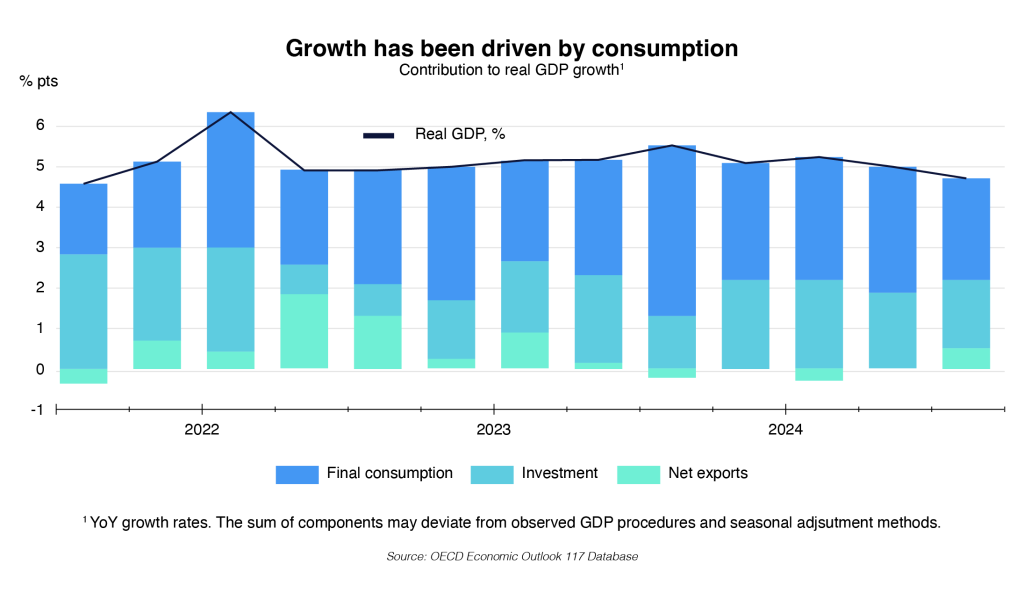Why Double Dates Matter in This Economy
Written by Olivia Dwi
Let’s be real, things have felt a little tighter lately. Prices are rising, everyday expenses keep piling up, and “treating yourself” feels more like a budgeting puzzle than a guilt-free reward. Especially for younger consumers, spending is now all about timing and value.
A McKinsey report revealed that 64% of Gen Z and Millennials in Southeast Asia are cutting back on non-essential purchases due to higher living costs. But that doesn’t mean they’ve stopped spending, they’re just being more strategic about when they spend.
We all recognize them: Double Dates — 9.9, 10.10, 11.11, 12.12. These mirrored dates have evolved into monthly shopping holidays. And in a tighter economy, they offer the perfect excuse to hit “checkout” without guilt.
The Bigger Picture: How Double Dates Fit Into Today’s Economy

Indonesia’s 2025 economy is projected to grow at 4.7–5%, slightly slower than the previous year. Cautious consumer sentiment, global uncertainty, and a decline in purchasing power have contributed to more selective spending overall.
Yet, there’s one sector bucking the trend: e-commerce. Digital platforms continue to show resilience and much of that strength is being driven by double date campaigns.
In an environment where people think twice before every purchase, these dates create a moment of clarity. For many, they’re the one time in a month when spending — even for essentials — feels not just justified, but smart.
Some platforms now report that up to 40% of monthly transactions happen during these promo periods. Discounts are getting deeper. Promo calendars more aggressive. And all of it is designed to meet a consumer base that’s increasingly value-driven and price-sensitive.
The Sweet Spot Between Saving and Spending
Snapcart’s survey (2023) of 3,500+ Indonesians found that only 12% had never joined a double date promo (mostly due to limited budgets), while 57% plan to join in the future. Their top reasons? Bigger discounts, chances to buy high-priced items affordably, and relevant product deals.
Even among past participants, enthusiasm remains high, 96% say they’ll join again. Most spend between IDR 100,000–500,000 and shop for fashion, beauty, or daily essentials. It’s clear: consumers are saving up, waiting, and spending smart. And double dates are becoming their go-to moment to do just that.
This behavior isn’t happening in a vacuum, it reflects a broader shift in how people navigate today’s economic realities.
Case Study: Shopee’s Double Date Success and the Psychology Behind It
A study by Jumarni and Andi Azhar (2025) found that Shopee’s double date campaigns, such as 9.9 and 11.11, effectively drive impulse buying by tapping into Fear of Missing Out (FOMO). Through countdowns, limited stock alerts, and social buzz, these campaigns create a sense of urgency that leads consumers to act quickly.

FOMO plays a key role in pushing shoppers toward spontaneous purchases, often bypassing rational decision-making. The emotional pressure to avoid missing out, especially when others appear to be getting the deal, amplifies the impact of already enticing promos.
“Double date promotions create time-based urgency and collective expectations that drive impulsive behavior among digital consumers.” — Trisna Mandala Putra, Researcher, Universitas Sumatera Utara
This case reinforces that idea. Well-crafted digital campaigns today go beyond discounts, they tap into psychology, social dynamics, and emotion. And in a climate where many sectors are slowing down, e-commerce continues to stand out, powered by strategies that speak to how people shop and feel online.
Why It All Matters
In a cautious economy like this, double dates have become highly anticipated moments, not just for shoppers, but also for brands. They’re more than just shopping gimmicks; they’re now part of the rhythm of how we spend.
For brands, the challenge is no longer just to show up, but to truly stand out during these peak moments.
Source:
Snapcart. (2023). Indonesians’ enthusiasm toward twin date sales in 2023. https://snapcart.global/indonesians-enthusiasm-toward-twin-date-sales-in-2023/
Boleh Dicoba. (n.d.). Twin date: Fenomena belanja tanggal kembar yang jadi budaya baru. https://bolehdicoba.com/news-blog/twin-date/
Radio Republik Indonesia. (2021, November 11). Asal-usul promo belanja tanggal kembar. https://www.rri.co.id/lain-lain/1111698/asal-usul-promo-belanja-tanggal-kembar
Boleh Dicoba. (n.d.). Promo twin date 11.11 dan Harbolnas: Apa aja sih persiapannya? https://bolehdicoba.com/news-blog/promo-twin-date-11-11-dan-harbolnas-apa-aja-sih-persiapannya/
Griity. (n.d.). Strategi tingkatkan omzet di payday, double date & lainnya. https://www.griity.id/resource/strategi-tingkatkan-omzet-payday-double-date-lainnya
Azhar, A., & Jumarni. (2025). The role of fear of missing out in mediating the effect of twin date event promotion e-commerce Shopee against impulsive buying tendency [Preprint]. ResearchGate. https://www.researchgate.net/publication/388212310
OECD. (2025). OECD economic outlook: Volume 2025 issue 1 – Indonesia. https://www.oecd.org/en/publications/oecd-economic-outlook-volume-2025-issue-1_83363382-en/full-report/indonesia_4c4ce2be.html
Locad. (2023, November 3). Double day sales rundown. https://golocad.com/blog/double-day-sales-rundown/
White, E. (2024, May 22). Asian consumers shift spending habits amid economic slowdown. Financial Times. https://www.ft.com/content/aae80518-0e3b-4d79-a2a3-339dfa162478
Putra, T. M., Nurhayati, N., & Pohan, S. (2024). Pengaruh Iklan Tanggal Kembar terhadap Perilaku Impulsive Buying pada Platform E-Commerce di Indonesia: Kajian Literatur Kualitatif. Jurnal Penelitian Inovatif, 4(4), 2625–2638. https://doi.org/10.54082/jupin.999
Search Keywords
Latest Posts

What Happens After Ramadan? Understanding the Post-Eid Consumer Shift
February 19, 2026

Indonesia’s Outlook 2026: How Conscious Consumers Are Spending
January 21, 2026

